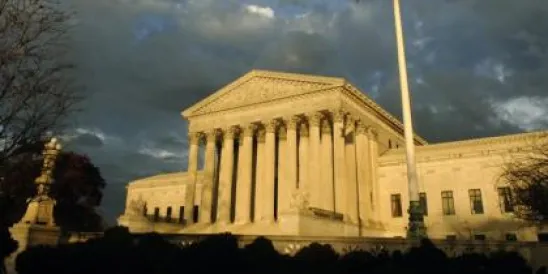Yesterday, the U.S. Supreme Court held in favor of the EEOC in EEOC v. Abercrombie & Fitch Store Stores, Inc. The EEOC claimed that Abercrombie violated Title VII of the Civil Rights Act of 1964 (Title VII) by refusing to hire a Muslim applicant who wears a headscarf for religious reasons. The decision, penned by Justice Scalia, reversed a decision by the Court of Appeals for the Tenth Circuit that granted summary judgment to Abercrombie and remanded the case for further consideration in light of today’s decision. The decision was joined by Justices Roberts, Kennedy, Ginsburg, Breyer, Sotomayor and Kagan. Justice Alito filed a concurring opinion. Justice Thomas filed an opinion dissenting, stating he would affirm the judgment of the Tenth Circuit, but agreeing with one small aspect of the decision.
Title VII prohibits discrimination because of and individual’s religion and defines “religion” broadly. “Religion” includes all aspects of religious observance and practice, as well as belief, unless an employer demonstrates that hit is unable to reasonably accommodate a religious observance or practice without an undue hardship on the business.
The plaintiff in this case, a practicing Muslim who wore a headscarf, applied for a job working in an Abercrombie retail store. Although otherwise qualified for the position, she was not hired because wearing a headscarf violated Abercrombie’s dress policy. The plaintiff did not affirmatively request an accommodation that would permit her to wear the headscarf at work. It was undisputed that Abercrombie rejected the plaintiff for the position because she wore a headscarf, but the record also indicated that Abercrombie did not know for sure if the reason she wore it was for religious reasons or if she had to wear it at work. Abercrombie argued that it did not have actual knowledge of the plaintiff’s need for an accommodation and therefore could not have intentionally discriminated or failed to accommodate the plaintiff. It was on this basis that the Tenth Circuit granted summary judgment for Abercrombie.
However, the Supreme Court held that an applicant “need only show that his need for [a religious] accommodation was a motivating factor in the employer’s decision” and that Title VII does not impose a burden on a plaintiff to demonstrate that a company had actual knowledge of the applicant’s or employee’s religion or need for an accommodation to show intentional discrimination on the basis of religion. The Supreme Court noted that in contrast to Title VII, the Americans with Disabilities Act does require proof that a defendant had actual knowledge of a disability for purposes of proving liability for intentional discrimination. The Supreme Court explained that Title VII focuses on whether religion was a motivating factor in an employment decision, and held that motive is distinct from knowledge.
The Supreme Court stated that “the rule for disparate-treatment claims based on a failure to accommodate a religious practice is straightforward: An employer may not make an applicant’s religious practice, confirmed or otherwise, a factor in employment decisions.” The Court noted that a request for accommodation may “make it easier to infer motive, but is not a necessary condition of liability.”
The Supreme Court distinguished religious discrimination from other forms of discrimination prohibited by Title VII (i.e., gender, race and national origin), stating that a neutral policy does not necessarily preclude a disparate treatment claim because, according to the Court, Title VII gives religious practices nominally favored treatment by requiring reasonable accommodation of religion, including modification of neutral policies if the modification does not present an undue hardship to the business.
In his concurrence, Justice Alito stated that in his view, the majority decision left out a critical element of liability — that although an employer does not have actual knowledge of the applicant’s or employee’s religion, it must know or suspect that the practice it refused to accommodate (in this case, the wearing of a headscarf) is a religious practice. Justice Alito pointed out that if the assistant manager who had interviewed the plaintiff did not suspect that the plaintiff was a Muslim or that she was wearing the headscarf for religious reasons, then there could be no liability. Justice Alito also took issue with the suggestion by the majority decision that it is a plaintiff’s burden to prove a failure to accommodate, citing the language of Title VII which, in his view, suggests that it is the employer’s burden to demonstrate that it is unable to reasonably accommodate the religious practice.
Justice Thomas dissented, stating he would have affirmed the decision of the Tenth Circuit because Abercrombie’s policy was religion-neutral and, in his view, no discriminatory motive could not be proven based on the record. Justice Thomas viewed the case as one more appropriate for a disparate impact analysis because it involved a neutral policy. However, he agreed with the majority’s holding that Title VII does not create a freestanding claim for failure to accommodate religion.
The EEOC issued guidance for employers on accommodation of religion last year.



 />i
/>i

